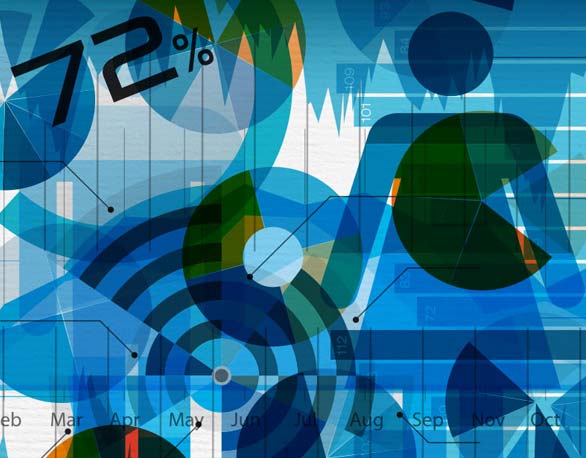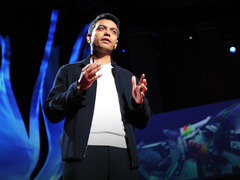 At TED2011, Deb Roy shared his talk, “The birth of a word,” describing when he and his wife, Rupal Patel, brought home their baby boy for the first time. The pair sought to shoot a different kind of home video: in every room of their house, a camera recorded eight to ten hours of footage a day.
At TED2011, Deb Roy shared his talk, “The birth of a word,” describing when he and his wife, Rupal Patel, brought home their baby boy for the first time. The pair sought to shoot a different kind of home video: in every room of their house, a camera recorded eight to ten hours of footage a day.
 Deb Roy: The birth of a word
After three years, Roy had roughly 90,000 hours of video and 140,000 hours of audio. But this wasn’t for sentimental purposes. Instead, they wished to study how a child learns language. The footage became a massive data set for Roy and his research team at MIT. Using unique data visualizations, they were able to track the many subtleties of a child’s learning process that they wouldn’t have been able to do in a lab.
Deb Roy: The birth of a word
After three years, Roy had roughly 90,000 hours of video and 140,000 hours of audio. But this wasn’t for sentimental purposes. Instead, they wished to study how a child learns language. The footage became a massive data set for Roy and his research team at MIT. Using unique data visualizations, they were able to track the many subtleties of a child’s learning process that they wouldn’t have been able to do in a lab.
His team wondered: could this kind of analysis be applied to television or, say, Twitter to discover communication trends?
These are the kinds of questions that today’s TED Weekends on the Huffington Post explores. Here, three of the great essays that are available now for your reading pleasure.
Three trajectories came together in 2005 and took me to new frontiers of cognitive science (and subsequently, it turns out, the media industry).
- The first trajectory: I began to see an unexpected connection between my research in robotics at MIT and theories of how children learn to talk, leading to studies of child language that I did with my wife and collaborator Rupal Patel over the past decade.
- Second: The era of Big Data was dawning, and the far-fetched idea of video-recording everything that happens in a home had become a practical reality.
- Third, Rupal and I learned that we were expecting our first child in July 2005.
This confluence of events sparked an unusual study of child language featured in the first half of my TEDTalk. Read the full essay »
Gayatri Devi: How Do I Improve My Memory? Forget More!
Do you know what is essential for a good memory? The ability to forget. To completely and thoroughly forget. Forgetting, like breathing or sleeping, is physiologically normal. This is at odds with our modern compulsion to record and remember everything and is a perfect recipe for anxiety.
Deb Roy, a cognitive science professor at MIT studying language, recorded 8-10 hours daily of the first three years of his son’s home life. He compiled a quarter million hours of audio and video, creating a 200,000 gigabyte “ultimate memory machine.” (Most computers store about one gigabyte.) Consider how much information each of us is exposed to in 24 hours, on streets, subways, screens and in sleep. Imagine recording and remembering all this. Thankfully, we were never meant to.
Fact: We are evolutionarily programmed to forget. Our brains evolved over millennia with built-in forgetfulness. Our brain is engineered to remember tastes, smells, voices, touch and visions, not names. Our brain is engineered to solve problems (How do we keep track of cattle? Mathematics; How do I communicate? Language), not remember disjointed facts. A fact not linked to a sense, an emotion, or a concept is quickly forgotten. Read the full essay »
Ben Hecht: Big Data Gets Personal in U.S. Cities
Much has already been said about how big data is dramatically changing the way that organizations make decisions. Today, more data is being created from more places than ever before. Blogs, Facebook, YouTube videos, retailer loyalty cards, mobile phones, and sensors on buildings are producing tons of data daily. Private sector companies, in their real-time data warehouses, are storing, analyzing, and harnessing it to help them to better understand their customers, dynamically alter pricing based on real-time demand, and even change their business models. And, more and more, government is putting the wealth of data that it generates to work to increase efficiency, save dollars, and create more proactive policy. But, as Deb Roy shows in his TED Talk, the true promise is where the numbers and patterns from this data connect and become personal — enabling us to understand and to respond to humanity and the world in ways previously unimaginable. This type of analysis has infinite potential for improving the human condition on an ongoing basis; and strengthening people’s commitment to our democracy. Already, in U.S. cities, we are seeing many promising signs of the transformative personal application of Big Data:
Mass Personalizing of Government Data and Services: The movement towards open government data in the U.S. has already had huge implications for the relationship between citizen and government. Read the full essay »
Comments (9)
Pingback: Strata Week: Can big data save human language? - O'Reilly Radar
Pingback: TED Weekends: Big data gets personal | Smile! Life is a journey not a race...
Pingback: Strata Week: Can big data save human language? - Strata
Pingback: TED Weekends: <b>Big data</b> gets personalBig Data Meetups | Big Data Meetups